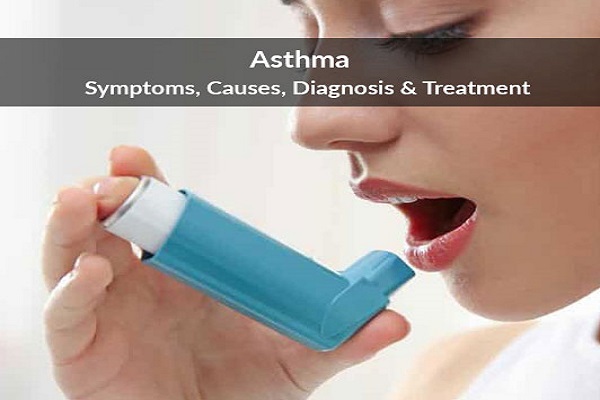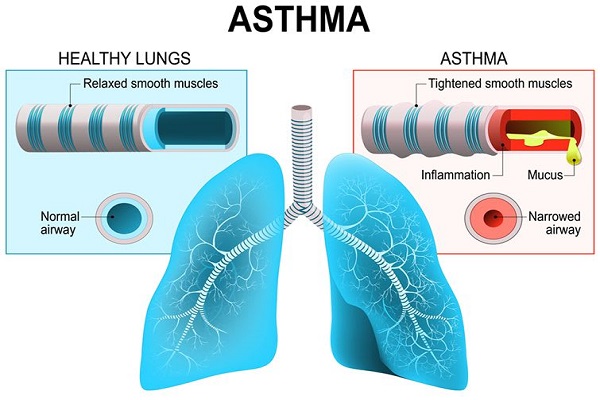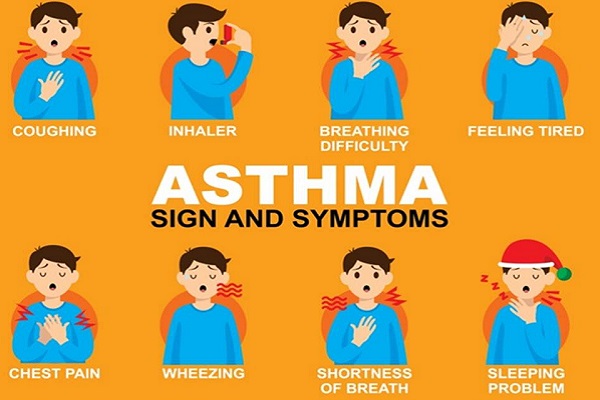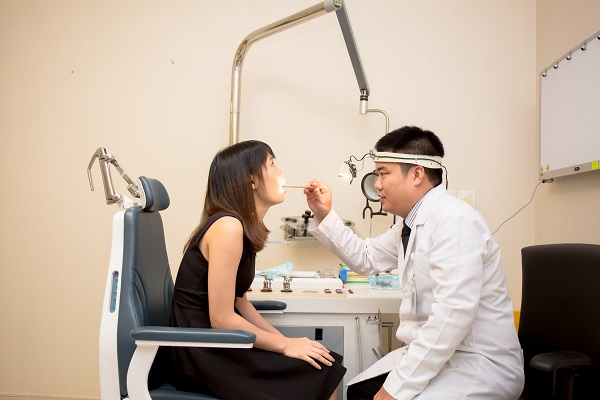Asthma affects the airways that carry oxygen in and out of the lungs. These airways are irritated and swollen in asthma patients and cause shortness of breath, wheezing, coughing, and tightness in the chest. In some people, asthmatic symptoms only appear when they are exposed to allergens while others have a kind of asthma that makes breathing difficult all the time.

Asthma is an inflammatory disease of the airways to the lungs, which makes breathing difficult. It can also make some physical activities difficult or even impossible. Bronchial Asthma is the most common type of asthma, which affects the bronchi in the lungs. Other forms of asthma include childhood asthma and adult-onset asthma. In adult-onset asthma, symptoms do not appear until the age of 20.
Asthmatic symptoms occur when the lining of the airways swell and the muscles around them tighten causing mucus to fill the airways, further reducing the amount of air that can pass through. This condition then brings on an asthma attack, which includes the coughing and tightness in the chest.
Bronchial Asthma is not a curable disease, but the symptoms can be controlled. Early treatment with corticosteroids seems to prevent or make better the functioning of the lungs. Mortality rate because of asthma has decreased over the last few decades due to better recognition and improvements in care and treatment.

How Does Asthma Affect Your Body?
Asthma affects the airways that carry oxygen in and out of the lungs. These airways are irritated and swollen in asthma patients and cause shortness of breath, wheezing, coughing, and tightness in the chest. In some people, asthmatic symptoms only appear when they are exposed to allergens while others have a kind of asthma that makes breathing difficult all the time.
What Are The Causes of Asthma?
- Genetics – If one of the parents has asthma, there’s a likely chance for the child to suffer from it as well.
- History of viral infections – A history of viral infections during childhood can develop the condition.
- Hygiene hypothesis – This hypothesis proposes that babies who aren’t exposed to enough bacteria in their early months and years, cannot fight Bronchial Asthma and other conditions due to a poorly developed immune system.
- Early allergen exposure – Frequent contact with allergens and irritants may increase the risk of developing asthma.
- Respiratory illness – Flu and pneumonia can trigger Bronchial Asthma attacks.
What Are The Risk Factors of Asthma?
- Sex – Boys are more likely to be diagnosed with asthma in childhood. While in adulthood, women are more frequently diagnosed with the condition.
- Genetics – Children born to parents with asthma are more likely to develop it.
- Health history – If diagnosed with certain conditions like allergies and eczema, then there is a chance of being diagnosed with Bronchial Asthma.
- Age – Majority of asthma diagnoses are made during childhood.
- Environment – People living in a heavily polluted area are at a greater risk of suffering from Asthma.
- Weight – Overweight or obese people are more likely to develop Asthma.
What Are The Symptoms of Asthma?
Symptoms of Asthma vary from individual to individual and the first symptom need not always be an asthma attack. If you encounter different symptoms other than the ones mentioned below, contact your doctor:
- Shortness of breath
- Chest tightness or pain
- Trouble sleeping caused by shortness of breath, coughing or wheezing
- A whistling or wheezing sound while exhaling
- Coughing or wheezing attacks, that are worsened by a respiratory virus like cold or flu
Sometimes the signs and symptoms of Bronchial Asthma flare up in certain situations:
- Exercise-induced asthma – Triggered by cold and dry air.
- Occupational asthma – Triggered by workplace irritants like chemical fumes, gases or dust.
- Allergy-induced asthma – Triggered by airborne substances like pollen, mold spores, cockroach waste, particles of skin, and dried saliva shed by pets.

How is Asthma Diagnosed?
- Health history – The doctor asks about the family medical history before moving further to perform tests.
- Physical exam – The breathing rate is determined using a stethoscope, followed by a skin test, to look for signs of an allergic reaction such as hives or eczema.
- Breathing tests – Pulmonary function tests (PFTs) are performed to measure the airflow in and out of the lungs.
- Methacholine test – This additional test is a known asthma trigger, that, when inhaled, causes mild constriction of the airways.
- Imaging tests – A chest X-ray and computerized tomography (CT) scan of the lungs and nose cavities (sinuses) are conducted to identify any structural abnormalities or diseases that can cause or aggravate breathing problems.
- Provocative testing for exercise and cold-induced asthma – This is done to measure airway obstruction before and after a vigorous physical activity is performed, or several breaths of cold air are taken.
How to Prevent and Control Asthma?
- Avoiding triggers – Use/contact with chemicals, smells, or products that have caused breathing problems in the past should be avoided.
- Reducing exposure to allergens – Allergens must be avoided.
- Getting allergy shots – With routine shots, the body becomes less sensitive to any triggers.
- Get vaccinated for influenza and pneumonia – Vaccinations can prevent flu and pneumonia from triggering Bronchial Asthma flare-ups.
Treatment of Asthma – Allopathic Treatment
Medications used to treat Bronchial Asthma are as follows:
- Inhalers and nebulizers – These are used with medicines that need to be inhaled deep into the lungs.
- Bronchodilators – These relax the tightened muscles in the lung, e.g., Theophylline.
- Anti-inflammatories – These target inflammation in the lungs that prevent breathing, e.g., Leukotriene modifiers.
- Immunodilators – These are used along with regular asthma medicines. They work by reducing the number of eosinophils, that play a role in causing asthma symptoms. Reslizumab (Cinqair) is one such example of an immunodilator.
Treatment of Asthma – Homeopathic Treatment
- Natrum Sulph – This drug is given to children and to people with hereditary asthma. Attacks caused by weather conditions like dampness and humid weather can be effectively dealt with, using this remedy.
- Arsenic Album – Chronic phase or acute state can be effectively treated by this medicine.
- Kali carb – Asthma attacks, especially during morning times, can be prevented by use of this medicine.
- Sambucus – It is one of the main homeopathic remedies for Bronchial Asthma in children when the attacks suddenly occur at night.
Asthma – Lifestyle Tips
- Add caffeine or caffeinated drinks in your diet
- Massage with mustard oil
- Eat a healthy and balanced diet
- Maintain a healthy weight
- Quit smoking
- Exercising regularly
- Manage stress
What Are The Recommended Exercises For a Person With Asthma?
- Yoga
- Walking
- Cycling
Wear protective masks while doing outdoor exercises.
Asthma & Pregnancy – Things to Know
- Asthma affects approximately 8 percent of women in their childbearing years.
- During pregnancy, symptoms are more likely to worsen in the second and third trimesters.
- It is necessary to treat Bronchial Asthma during pregnancy.
- Untreated Asthma can lead to complications such as severe morning sickness, preterm labor, pregnancy-induced high blood pressure, or preeclampsia.
Common Complications Related to Asthma
- Asthma flare-ups can interfere with your day-to-day activities.
- Permanent narrowing of the bronchial tubes can affect breathing.
- Prolonged use of some Asthma medications can cause side effects.
When to see a doctor
Seek emergency treatment
Severe asthma attacks can be life-threatening. Work with your doctor to determine what to do when your signs and symptoms worsen — and when you need emergency treatment. Signs of an asthma emergency include:
- Rapid worsening of shortness of breath or wheezing
- No improvement even after using a quick-relief inhaler, such as albuterol
- Shortness of breath when you are doing minimal physical activity

For appointment or more information about medical services provided by the ENT Clinic, please contact:
- Nurse Station: (8428) 6280 3333, ext. 8172
- Reception Desk: (8428) 6280 3333, ext. 8137 or 8139
Or call City International Hospital
- Operator: (8428) 6280 3333, ext.0
- Address: No. 3, 17A Street, Binh Tri Dong B Ward, Binh Tan Dist. (Next to AEON Mall Binh Tan), Ho Chi Minh City.
- Website: https://cih.com.vn/en/
- Email: This email address is being protected from spambots. You need JavaScript enabled to view it.
Disclaimer:
As a service to our readers, City International Hospital (CIH) provides access to our library of archived content. Please note the date of last review on all articles. No content on this site, regardless of date, should ever be used as a substitute for direct medical advice from your doctor or other qualified clinician.










